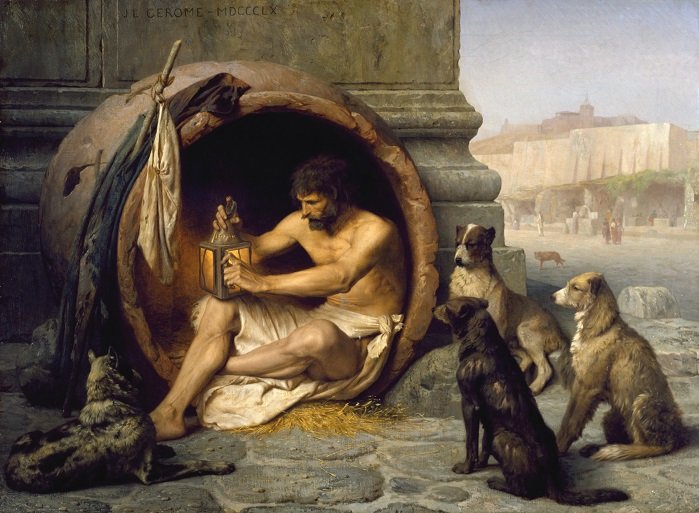
Diogenes, Oil On Canvas by Jean Léon Gérôme (1824-1904) image source
Cynicism
The Cynics, Greek philosophers, formed a philosophical flow in the 6th and 5th centuries BC. They develop Socrates' irony to the complete disregard of social conventions and emphasize their desire to be independent in the moral and intellectual sphere (as intellectuals and moral people). Marginals and despised personalities to the philosophers of the Cyrenaic School, they come from modest, alien to the Athenian life families. Their disciples gathered around the Cynosarges (the mausoleum of the Dog, from which their name comes), in the neighborhood of the White Dog, located on the outskirts of Athens. Antisthenes defines himself as "the real dog": he is the founder of the cynics school. Born by the Athenian father and mother Thracian, Antisthenes belonged to the class of nothoi, like the freed slaves and the illegitimate. A scholar of Socrates, he swings quickly with the aristocrat Plato. Still, he will be present at the death of Socrates, to whom he is affectionate. But from the teachings of his Master he only perceives irony, negative dialectics and freedom of spirit.
Antisthenes goes from the uncompromising nostalinism that lowers the truth to a game of words. The judgment has no basis and only the principle of similarity remains; I can only say, "Socrates is Socrates"; any other attribute would be wrong. One can neither reason, prove, nor deny: the truth is as it appears to everyone. Radical skepticism seems to be supported by a simplistically understood materialism: there are only the visible, tangible, heard real things, the rest is an illusion. Jaso's feelings of the Sophists' criticism, especially of Gorgi, are felt. But the big issue for cynics is the absolute contradiction they find between nature (phisis) and law (nomos). Everything that is related to social life and institutions is artificial and subject to condemnation, whether it is law, science, morality; Fun and judgmental are luxury and sophistication, belief in diviners and gods, fine arts, and so on. The most colorful of this circle and the most popular, Diogen of Synopsis, develops this doctrine to provocation by not respecting any social conventions: describing it as dirty, without a tunic, shameless, living from nothing, overnight, where the first wondering "ungrateful beggar" of philosophy. And the man he is looking for with a flashlight in the middle of a day is someone like him, indifferent to any conditionality and living only by nature.
In moral terms, cynics preach the renunciation of material goods and possession of the body, its needs and desires. These thinkers deny politics and civilization. According to them, even suicide must be denied because it relieves the suffering. Cynics contribute in their own way to the appearance of the ancient sage. But they outline it with bold paradoxes (as the Stoics describe later). The real change, the real asceticism, implies the rise above the traps of the popular opinion, submissive to false social values. Alienated from all the goods of this world, he gave away all that he could possess, free from all attachment, indifferent to any class and racial prejudices, without a family , without ambition, rough, but frail, predisposed, the sage is the only person who knows the true virtue because he is the only person who is in all things true to nature. Cynism is not so established doctrine / Antissthenes 's works are missing / as a center of controversy, an outbreak in which scandalous and enchanting personalities whose ideas are only known by the second hand but whose influence will continue until the 6th century from St. Augustine still mentions them).
Skepticism
In weekly use, the term "skepticism" means an unfavorable view of the success of an undertaking. The skeptic presents himself as an unbeliever and, in general, does not trust any supposed truth and any dogmatics. In philosophy, the first fundamental meaning is to maintain the thesis that truth is unattainable, which is, albeit paradox, true. In fact, historically and in view of the Greek word skepsis, which means verification, the skeptical doctrine, founded in 4th century BC from Nail by Elida, maintains that the truth certainly can not be achieved. So the philosopher must, in order to achieve the wisdom that consists in the ataraxia, to apply the doubts constantly and to avoid evaluation (iphok). It can be argued that in the working life it is necessary to act, ie. one can not doubt everything. Thus, through Antiquity, skepticism is transformed by Carneas of Kirena (212-128 BC) into probability theory / probabili- sism /. The criterion for truth of a statement is the likelihood of arousing trust. One thing is as real as the more trust arouses, and the more trust arouses, the more likely the opinions that contradict it are less. Closer to us is Hume's skepticism (1711-1776), which inspired Kant and Bertrand Russell (1872-1970). It claims that most of our knowledge is only belief. This excludes the metaphysics from philosophy and every claim to know the absolute, the world, the soul, and God.
Nice post
thanks
I like cynism than skepticism.
Cynism is a state of mind, skepticism is doubting.
Great information. Keep going
thank you :)
Dog is God backwards :)
true :D Here is one song about that
Funky, takes some getting used to, but then it gets pretty catchy :)
The photos are so amazing I just saw a picture like this that very good thanks have shared @godflesh
you are welcome
👍👍👍👍👍
:)
You got a 6.69% upvote from @postpromoter courtesy of @godflesh!
Want to promote your posts too? Check out the Steem Bot Tracker website for more info. If you would like to support the development of @postpromoter and the bot tracker please vote for @yabapmatt for witness!
If you made a podcast I would absolutely listen :-)